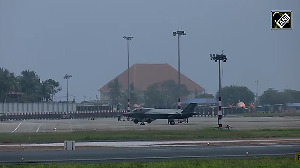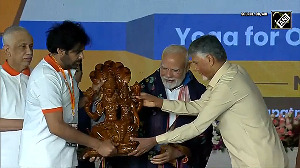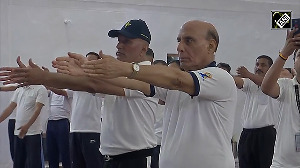Hajim al-Hassani, speaking minutes after the midnight deadline, said that after three days of meetings, "We found that time was late and we saw that the matters will need another day in order to reach results that please everyone."
-
Also read: US welcomes Iraq's constitution
Earlier, however, a Sunni Arab negotiator said Shiites didn't even show up for a late-night meeting. Friday's session was an attempt to give the Shiites time to respond to proposals tabled at the meeting they didn't attend, al-Hassani said.
"There are pressures on everyone -- by the Americans and also by factions," Kurdish negotiator Mahmoud Othman said. "They believe that there is hope and for that reason (al-Hassani) asked for an extension on the hope that maybe they reach the final stages."
But senior Shiite negotiator Ali Dabbagh said his bloc would resist any further changes to the draft that was submitted to parliament last Monday. Other Shiite lawmakers said it was time to stop haggling and let the voters decide.
Al-Hassani, a Sunni who was elected on the mostly Sunni ticket headed by former President Ghazi al-Yawer, agreed that no parliamentary vote was required since the assembly fulfilled its legal obligations by accepting the Shiite and Kurdish-approved draft three days ago.
"We legally received the draft. We are optimistic, although there are some differences. But if we will not be able to reach agreements in the end, this constitution is going to be presented for the Iraqis in an October 15 referendum."
"Legally we do not need the parliament to vote on the draft, but we need only a consensus so that all the Iraqis will say yes to the constitution," he said. "I still believe that the door is wide enough for reaching agreements."
Last Monday was the second deadline that the legislature granted after the drafting committee failed to meet the August 15 date set in the interim constitution.
The Parliament speaker said that discussions in the past three days were "very good in which points of views were exchanged". He said they discussed federalism, references to Saddam Hussein's Baath party and the constitution's introduction.
The Shiite alliance and the Kurds together control 221 of the 275 Parliament seats and could win easily in a parliamentary vote on the charter, which requires only a majority. With 60 percent of the population, the Shiites and their Kurdish allies are gambling that the draft would win approval in the referendum.
However, the perception that the Shiites and Kurds pushed through a document unacceptable to the Sunnis could sharpen religious and ethnic tensions.






